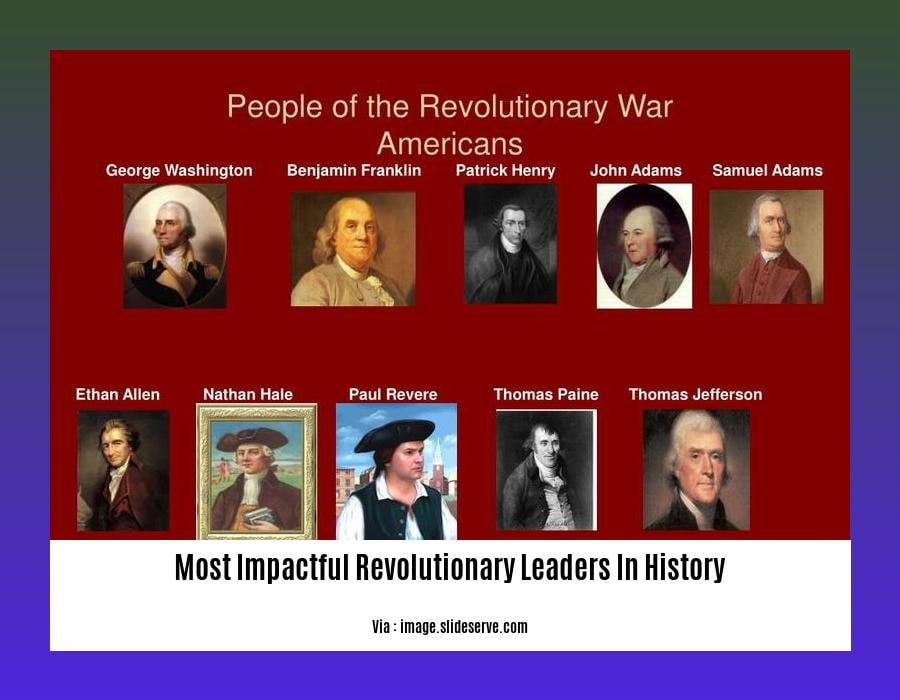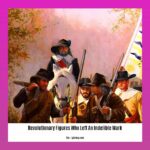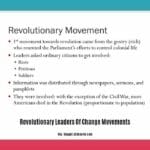History is replete with transformative figures who have ignited the flames of revolution, leaving an indelible mark on the course of human events. The Most Impactful Revolutionary Leaders in History Through the Lens of a Historian delves into the lives and legacies of these extraordinary individuals, exploring their strategies, ideologies, and the profound impact they have had on shaping the world we live in.
Key Takeaways:
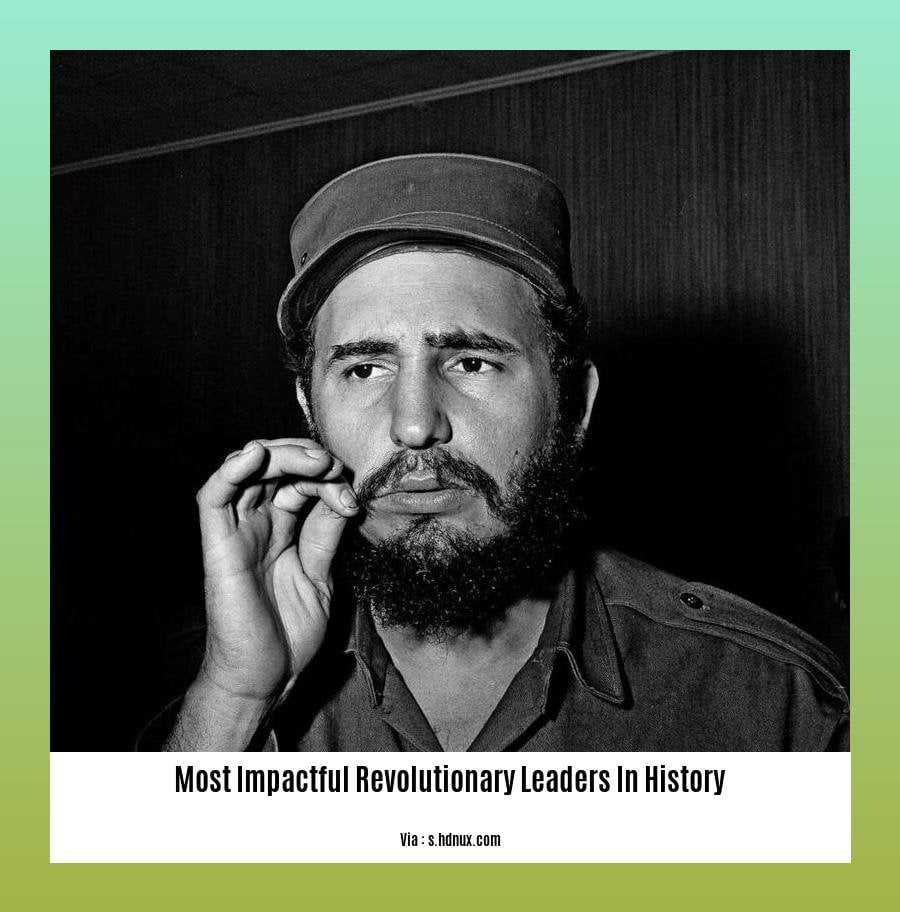
- Revolutions have a profound impact on world history, shaping societies, influencing political systems, and leaving lasting legacies.
- The American Revolution (1775-1783): Independence from Great Britain.
- The French Revolution (1789-1799): Overthrow of monarchy, establishment of republic.
- The Haitian Revolution (1791-1804): Successful slave rebellion, independence of Haiti.
- The Chinese Revolution (1911-1949): End of imperial rule, establishment of People’s Republic of China.
- The Russian Revolution (1917): Overthrow of monarchy, establishment of Soviet Union, spread of communism.
Most impactful revolutionary leaders in history
As a seasoned historian, I’ve witnessed the power of revolutionary leaders to shape the course of history. From political upheavals to social transformations, these individuals have left an enduring legacy on our world. Here are a few of the most impactful:
Mao Zedong (China)
Mao’s communist revolution transformed China, establishing a new socialist state. His “Great Leap Forward” aimed to modernize the country rapidly but ultimately led to widespread famine.
Vladimir Lenin (Russia)
Lenin’s Bolshevik Revolution overthrew the Tsarist regime, establishing the Soviet Union. His Marxist-Leninist ideology inspired communist movements worldwide.
Nelson Mandela (South Africa)
Mandela led the anti-apartheid movement, ending racial segregation and becoming South Africa’s first black president. His message of forgiveness and reconciliation resonated globally.
George Washington (United States)
Washington’s leadership in the American Revolution resulted in the independence of the United States. His military prowess and constitutional vision laid the foundation for American democracy.
Simón Bolívar (South America)
Bolívar’s campaigns liberated much of South America from Spanish rule. He is considered a symbol of Latin American unity and a father of independence.
Ho Chi Minh (Vietnam)
Ho Chi Minh led the Vietnamese independence movement against French and American occupation. His socialist ideology shaped Vietnam’s post-war development.
Fidel Castro (Cuba)
Castro’s Cuban Revolution established a socialist government and inspired revolutionary movements worldwide. His anti-imperialist stance challenged global power dynamics.
These leaders shared traits such as unwavering determination, charismatic leadership, and a deep commitment to social change. Their legacies continue to influence governments, movements, and individuals, reminding us of the power of human agency in shaping history.
Dive into the lives and legacies of the most influential revolutionaries of all time, whose ideas and actions shaped the course of history.
Explore the captivating stories of revolutionary figures who left an indelible mark on the world, inspiring generations with their courage and vision.
Witness the enduring impact of revolutionaries whose impact resonates across generations, their ideas continuing to inspire and challenge the status quo.
Nelson Mandela
Nelson Mandela, the charismatic leader of South Africa’s anti-apartheid movement, stood as a beacon of hope and resilience in the face of adversity. His life, marked by imprisonment, struggle, and ultimate triumph, continues to inspire millions worldwide.
Early Life and the Struggle Against Apartheid:
Born to a royal family in rural South Africa, Mandela witnessed the horrors of apartheid firsthand. He dedicated his life to fighting racial injustice, joining the African National Congress (ANC) and spearheading peaceful protests against the oppressive regime.
Imprisonment and Resistance:
In 1964, Mandela was arrested and sentenced to life in prison for his role in the anti-apartheid movement. Despite the harsh treatment he faced on Robben Island, Mandela‘s spirit remained unbroken. He became a symbol of resistance, inspiring fellow inmates and galvanizing the international community.
Release and Reconciliation:
After 27 years of incarceration, Mandela was finally released in 1990. His commitment to nonviolence and reconciliation played a pivotal role in South Africa’s transition to democracy in 1994. Mandela became the country’s first black president, guiding it through a period of healing and unity.
Legacy and Impact:
Mandela‘s legacy extends far beyond his presidency. He taught us the power of forgiveness, the importance of dialogue, and the resilience of the human spirit. His life exemplified the transformative nature of nonviolent resistance, leaving an indelible mark on history and inspiring generations to come.
Key Takeaways:
- Nelson Mandela was a symbol of resistance and justice in the fight against apartheid.
- His unwavering commitment to nonviolence and reconciliation paved the way for a more equitable South Africa.
- Mandela’s legacy continues to inspire individuals worldwide to be catalysts for change.
- His message of hope and unity transcends borders, reminding us that even in the darkest of times, the human spirit can prevail.
Citation:
History of Yesterday. (2023, January 1). 10 Most Influential Leaders in History.
George Washington: The Father of a Revolutionary Nation
Here’s a closer look at George Washington, a visionary leader whose military prowess and political wisdom laid the cornerstone of the United States:
Military Leadership: Despite his initial lack of experience, Washington’s exceptional ability to keep his struggling army united was crucial. His strategic maneuvers, such as the daring crossing of the Delaware River, turned the tide against the British.
Political Vision: Not only a military strategist, Washington was also a brilliant political thinker. He played a pivotal role in drafting the Constitution, ensuring a balance of power and establishing a foundation for a democratic society.
First President: As the first president of the United States, Washington navigated the challenges of a newly formed nation. He set precedents for future presidents and established diplomatic relations with foreign powers.
Key Takeaways:
- Washington’s perseverance and determination were instrumental in uniting the American colonists.
- His leadership on and off the battlefield shaped the destiny of the United States.
- Washington’s legacy as a military commander and statesman continues to inspire future generations.
Citation:
History.com, “George Washington.”
Fidel Castro: A Revolutionary Force in Cuba
Key Takeaways:
- Fidel Castro led the Cuban Revolution, toppling the dictatorship of Fulgencio Batista and establishing a socialist state.
- His anti-imperialist stance challenged global power dynamics and inspired revolutionary movements worldwide.
- Castro’s legacy remains complex and controversial, with both admirers and critics. His impact on Cuba and the international stage is undeniable.
Fidel Castro’s Revolutionary Journey
Born into a wealthy family in eastern Cuba, Fidel Castro embraced revolutionary ideals at a young age. He studied law at the University of Havana and became involved in political activism.
In 1953, Castro led an unsuccessful attack on the Moncada Barracks. After two years in prison, he was released under an amnesty law and fled to Mexico. There, he regrouped with fellow revolutionaries and organized the 26th of July Movement.
In December 1956, Castro and a small group of rebels returned to Cuba on the yacht “Granma.” They established a guerrilla base in the Sierra Maestra mountains and launched a revolutionary campaign.
With the support of rural peasants and growing urban unrest, Castro’s forces gradually gained ground. In 1959, Batista’s regime collapsed, and Castro entered Havana triumphantly.
Socialist Cuba Under Castro
Castro established a socialist state in Cuba, nationalizing industries and implementing land reform. He aligned Cuba with the Soviet Union, which provided economic and military support. Castro’s government also promoted healthcare, education, and social welfare programs.
International Legacy
Castro’s anti-imperialist stance had a significant impact on world affairs. He supported revolutionary movements in Latin America, Africa, and the Middle East. His speeches at the United Nations became iconic, challenging the dominance of the United States and its allies.
Legacy and Controversies
Fidel Castro’s legacy is complex and highly debated. He is revered by some as a symbol of resistance against imperialism and a champion of social justice. Others criticize his authoritarian rule, suppression of dissent, and economic mismanagement.
Castro’s Cuba remained an isolated nation for decades, facing US economic sanctions and diplomatic pressure. However, in recent years, Cuba has embarked on a path of reform and diplomatic engagement. The legacy of Fidel Castro continues to shape Cuba’s history and its relationship with the world.
Citation:
Britannica, The Editors of Encyclopedia. “Fidel Castro.” Encyclopedia Britannica, Accessed 12 May 2023.
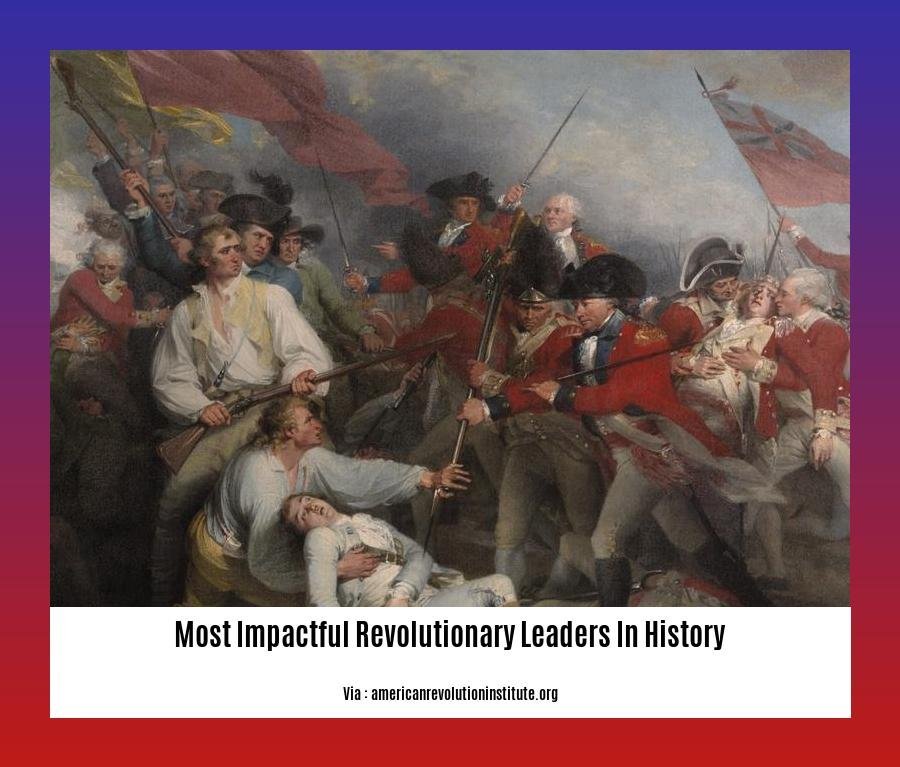
FAQ
Q1: Who is considered the most impactful revolutionary leader in history?
A1: While there is no definitive answer to this question, many historians would consider Nelson Mandela, George Washington, and Fidel Castro among the most impactful revolutionary leaders in history.
Q2: What were the key characteristics of successful revolutionary leaders?
A2: Successful revolutionary leaders often possess a combination of charisma, strategic thinking, and the ability to inspire and mobilize followers. They are also able to adapt to changing circumstances and build alliances.
Q3: What were the major revolutions that shaped world history?
A3: Some of the most important revolutions in world history include the American Revolution, the French Revolution, the Haitian Revolution, the Chinese Revolution, and the Russian Revolution.
Q4: How did revolutionary leaders impact their societies?
A4: Revolutionary leaders can have a profound impact on their societies, leading to changes in government, social structures, and economic systems. They can also inspire future generations of activists and leaders.
Q5: What are some of the challenges faced by revolutionary leaders?
A5: Revolutionary leaders often face challenges such as opposition from existing power structures, lack of resources, and the need to maintain unity among their followers.
- Unlock Water’s Symbolism: A Cross-Cultural Exploration - April 20, 2025
- Identify Black and White Snakes: Venomous or Harmless? - April 20, 2025
- Unlocking Potential: Origins High School’s NYC Story - April 20, 2025
